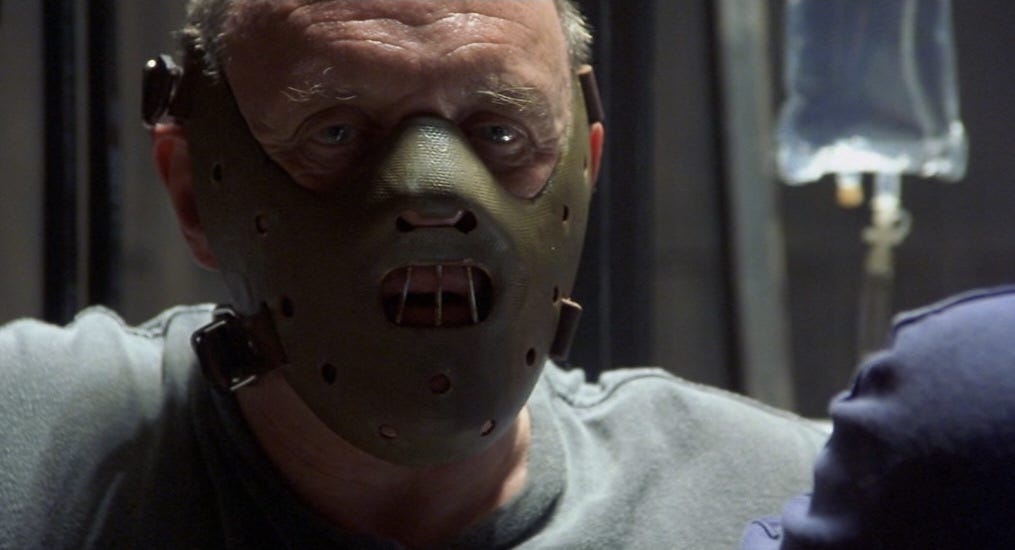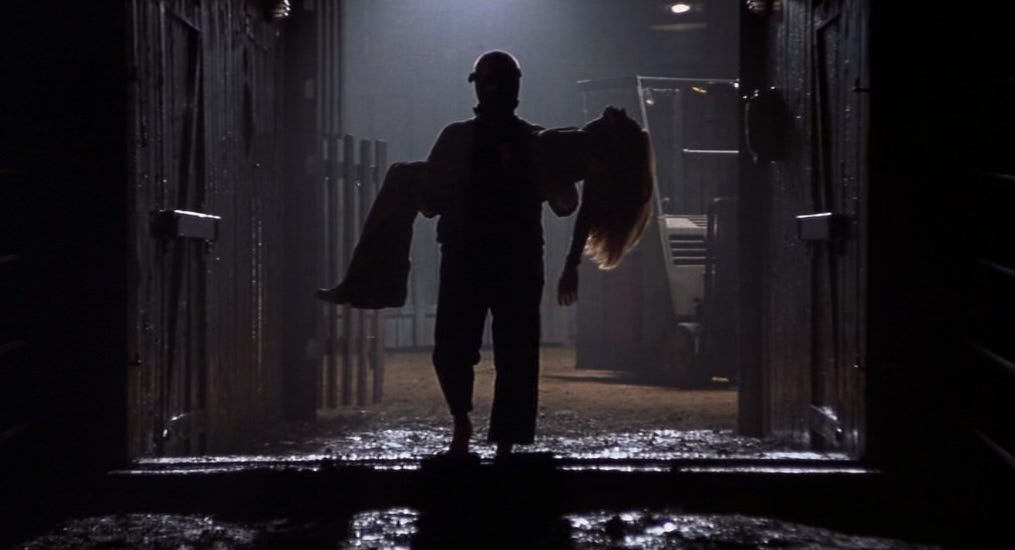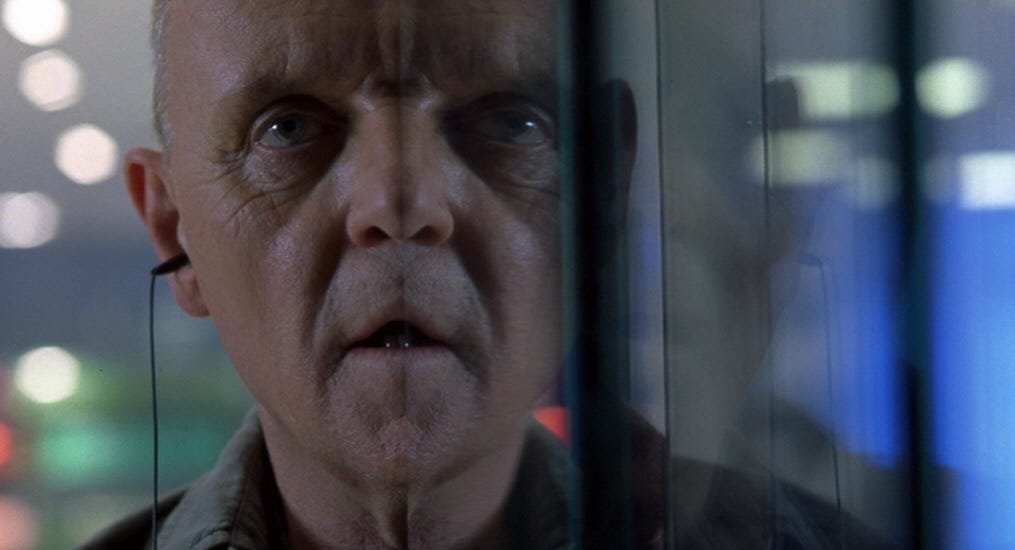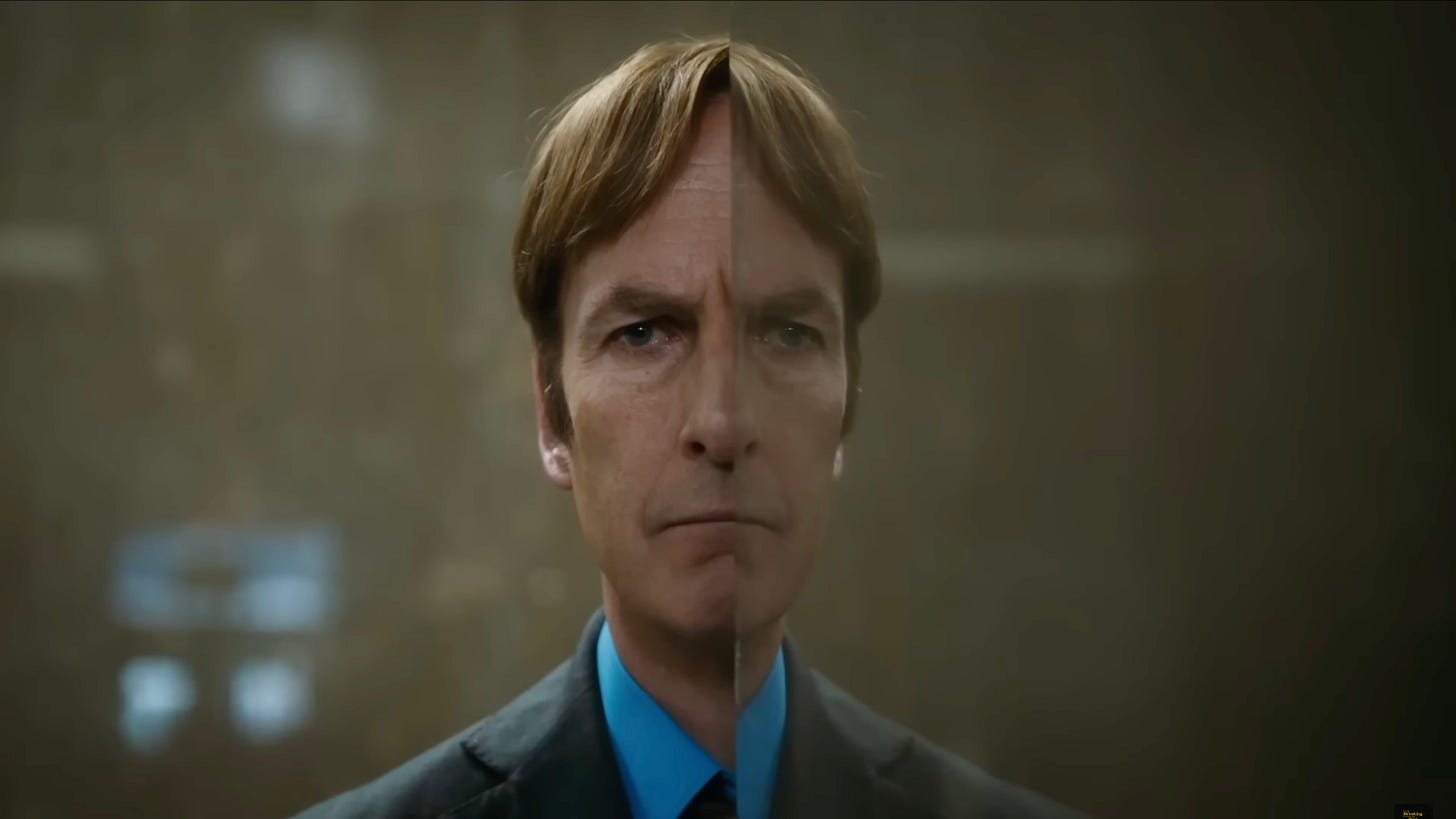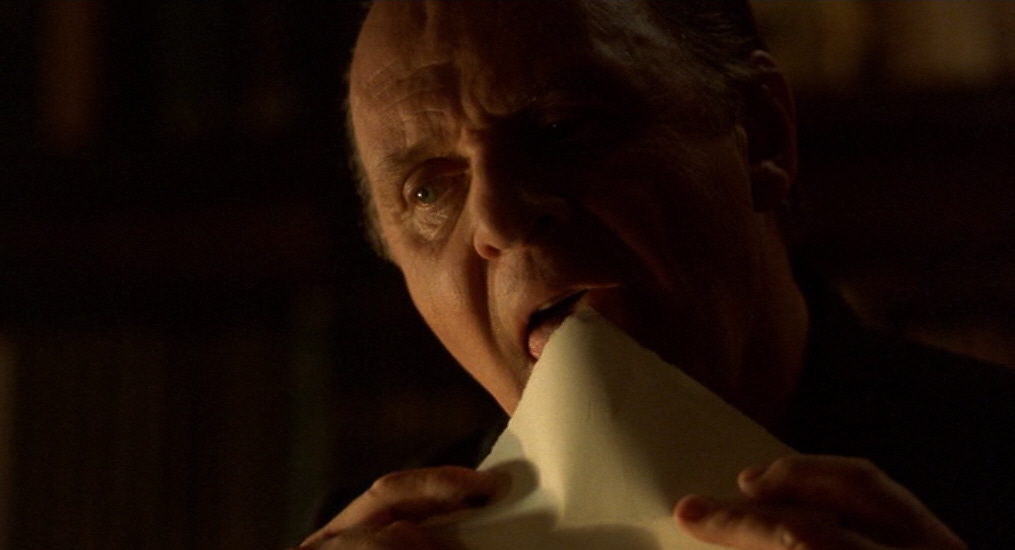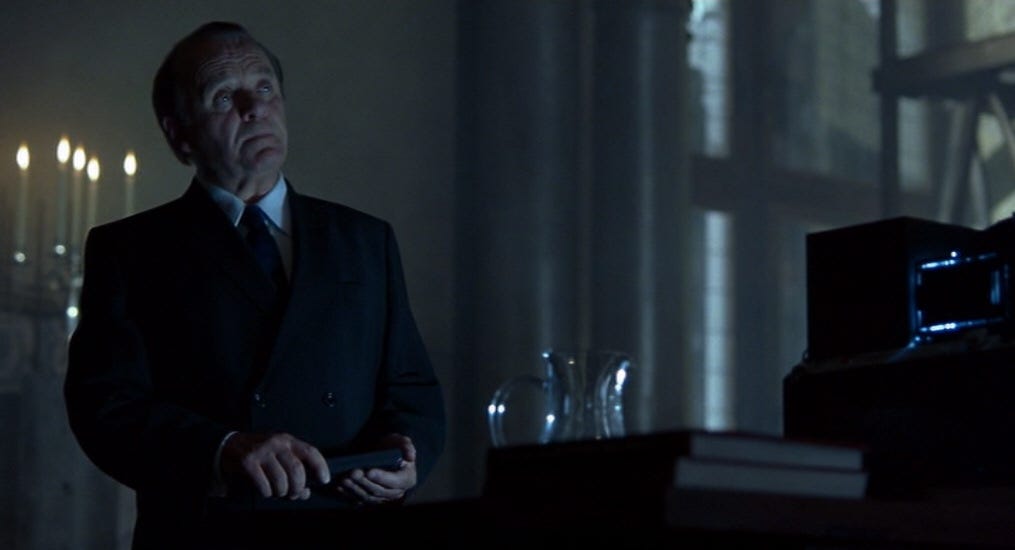Review: Ridley Scott's "Hannibal" is not Thomas Harris' "Hannibal," but I wish it was
Movie of the Week #13 has an old friend for dinner
Welcome to Movie of the Week, a Wednesday column where we take a look back at a classic, obscure, or otherwise interesting movie each and every week for paid subscribers. Follow this link for more details on everything you get subscribing to Fade to Lack!
I wish I could see an actual adaptation of Thomas Harris’ Hannibal directed by Ridley Scott.
There is, to be clear, a film by Ridley Scott called Hannibal, nominally based on the 1999 novel of the same name by Red Dragon and The Silence of the Lambs author Thomas Harris, and it goes through many of the plot points from that book as you’d see them laid out in a Wikipedia summary. But Scott’s Hannibal isn’t really an adaptation of Harris’ Hannibal. The overall valence is too different, the edges too far sanded down, the characters too thinned out, the grand guignol spectacle and performative provocations of Harris’ text abandoned in favor of a largely bland and unremarkable police procedural that remembers it’s supposed to be a horror film only in the last 20 minutes. I want to see Scott’s take on the actual book, the one where Hannibal Lecter hangs out in a museum of torture instruments to register “aspects of damnation from the avid faces of the voyeurs” examining the exhibits (p. 171); where Lecter is obsessed with his dead sister Mischa, and scribbles equations in a notebook in a fruitless attempt to find a mathematical proof for time travel so that “no longer should increasing entropy mark the direction of time” (p. 464); where Mason Verger drinks “martinis made with tears” (p. 428) and is killed with his own pet eel by his bodybuilder sister Margot after she obtains his sperm by sodomizing him with a cattle prod (on Dr. Lecter’s suggestion, of course); where Hannibal Lecter and Clarice Starling joyfully feast on the sauteed brain of FBI agent Paul Krendler in front of his still-conscious body – “Dr. Lecter found the shine of butter sauce on her lip intensely moving,” we are told, after she takes her first bite (p. 504) – and then proceed to have a torrid, passionate love affair across the globe.
I want, in short, to take a trip to the alternate universe where Ridley Scott made a version of Hannibal that really pissed people off.
Because here’s the thing: the actual book that Thomas Harris wrote – a bizarre, grotesque, scabrously angry and bitter work of nihilistic fury that finds haunting beauty in some of its darkest material – is the perfect fit for Ridley Scott, director of such films as Alien: Covenant, which we covered here in August and which can also be accurately described as a bizarre, grotesque, scabrously angry and bitter work of nihilistic fury that finds haunting beauty in some of its darkest material. I wrote in that piece about how there are at least two Ridley Scotts: One a genuine auteur who pours all of himself and then some into the images he conjures, the other a talented director-for-hire who will competently execute the script he is given without offering any real sense he cares about the material at all. Hannibal is an example of the latter Ridley Scott, technically accomplished but entirely soulless, a movie terrified of its own source material and determined not to challenge or confront a single member of the audience. I don’t necessarily blame Scott. After the years of development hell in which a Silence of the Lambs follow-up spent languishing, all the studio wanted was another film with Anthony Hopkins as Hannibal Lecter; they did not ask for ‘art,’ and in fact almost certainly commanded all involved to run as far in the other direction as possible given how controversial Harris’ novel turned out to be. Hannibal in book form is a work that will, to at least some extent, offend every single person who reads it; Hannibal the movie can only offend insomuch as its lack of ambition is an affront to the two capital-G Great films that preceded it – 1991’s Silence of the Lambs and 1986’s Manhunter, which I also covered here – and to the source material that, whatever else one might say about it, at least swung for the goddamn fences.
Harris’ Hannibal is a fascinating book, and appreciated on its own subversive wavelength, I think it might even be a great one. It zigs in every place we expect it to zag, and can only be understood as Harris’ attempt to do to Hannibal Lecter what Arthur Conan Doyle did to Sherlock Holmes in The Final Problem: to kill all public interest in the creation that had consumed his professional life. Doyle, famously, failed at that. He killed Holmes, but he told too good a story to leave readers satisfied with the detective’s death; eventually, he had to come back to do more, resurrecting the Holmes stories with Hound of the Baskervilles, and then resuscitating Holmes’ actual body with The Empty House. Harris goes a weirder, angrier, and altogether more effective route, provided the specific goal is to end the franchise. He doesn’t kill Hannibal Lecter, but instead elevates the cannibalistic villain and his insane worldview to the central, guiding ethos of his story, to such an extent the public might be forever turned off by the prospect of future stories. And it mostly worked. Harris’ fourth book, Hannibal Rising, only exists because he was creatively blackmailed by film producer Dino De Laurentiis, who told the author that if he did not write an origin story for Dr. Lecter, they would get someone else to do it. Since then, the fervor for new stories has faded entirely; Hannibal the movie was a commercial success but a critical disappointment, and after the hastily-produced follow-up Red Dragon, inexplicably helmed by Rush Hour director/serial pervert Brett Ratner, there have been no further efforts to get Anthony Hopkins back in the part. The Bryan Fuller-created Hannibal series for NBC is almost certainly one of the ten best shows to ever air on network television, but it was also a deliriously anti-commercial avant-garde experiment that returned horrible ratings and further sank shareholder appetite for more Hannibal Lecter media. In the long run, Harris seemingly succeeded in driving a stake through the heart of his most famous creation.
There is a pair of sentences at the start of Hannibal Chapter 20 that absolutely feel like the book’s thesis statement, doubling as an expression of Harris’ frustration in having to write the book at all:
Now that ceaseless exposure has calloused us to the lewd and the vulgar, it is instructive to see what still seems wicked to us. What still slaps the clammy flab of our submissive consciousness hard enough to get our attention? (p. 136)
This quote introduces a scene at the aforementioned museum for torture devices, an exhibit called “Atrocious Torture Instruments,” whose promoters were unexpectedly launched to wealth and fame thanks to the lurid exhibit’s surprising popularity. It is very clearly Harris satirizing the interest in his own novels, the wealth he himself accrued from such stories and the explosion of interest in serial killer narratives that followed The Silence of the Lambs (and has progressed unabated in the 21st century). Later in the chapter, he writes:
The exposition of Atrocious Torture Instruments could not fail to appeal to a connoisseur of the worst in mankind. But the essence of the worst, the true asafoetida1 of the human spirit, is not found in the Iron Maiden or the whetted edge; Elemental Ugliness is found in the faces of the crowd. (p. 137)
These sentences are a direct and enthusiastic spit into the face of the reader, and the Atrocious Torture Instruments museum is, as a setting, a microcosm of the novel itself. This is a profoundly cynical text positing that the world – and even more importantly the systems humans build to live in it – are absolute shit; that the forces of sexism, classism, and entrenched bureaucracy are too implacable for even a woman as great as Clarice Starling to succeed; that government, law enforcement, and media are too broken and corrupt to hold a rich pedophile like Mason Verger to account; that notorious serial killer Hannibal Lecter can walk free through Europe confident in the knowledge that any local police he encounters will be too blinded by the size of the bounty on his head to actually try bringing him to justice. Even Barney, the kind orderly from Red Dragon and Silence of the Lambs – played by beloved character actor Frankie Faison in all the films – is here rendered grotesque, a man selling trinkets from Dr. Lecter’s abandoned cell, who picks up dead pigeons off the street to take home and eat. The very prose of the novel rebels against itself, constantly switching between past and present tense, frequently offering barest fragments of sentences; sometimes it is penned like the screen directions of a film script, and sometimes it is written in second person like Jay McInerney’s Bright Lights, Big City. The book reads as though it did not want to be written; in his 2001 essay collection The War Against Cliché, Martin Amis called Hannibal “a necropolis of prose” (p. 240). I agree, but I don’t necessarily see that as a negative.
Hannibal is a fierce provocateur of a book, but it is not one without purpose. Harris’ text is meticulous in putting Clarice Starling face-to-face with system after system that is failed or failing, painting a vision of a fallen world that is slowly crushing us all. The two major institutions explored in the book are law enforcement and slaughterhouses, the two equated as utterly corrupt and profoundly, perhaps even fundamentally, immoral. The FBI is so fetid, so rank with misogyny, incompetence, and corruption that Clarice Starling’s career has completely stalled out in the years since Silence of the Lambs; no effort she makes within the system ever comes to anything meaningful or productive, and only makes her life and the lives of those around her worse. In introducing the disfigured Mason Verger and his long-festering vendetta against Hannibal Lecter, Harris details how Verger’s family made its fortune on slaughterhouses, and all the kinds of cruelty concomitant with that profession: bribing congress to halt or roll back humanitarian laws; experimenting on how much a pig could be starved before it died; sticking a knife into a pig’s back to check the depth of its fat; busting unions so workers attending to the animals could be abused. It is a system built to produce a monster like Mason Verger, whose sadism knows no bounds and whose wealth places him firmly outside the law. Harris tells us that “with a lifetime of knowledge and experience, Mason felt like Stradivarius approaching the worktable as he built the engines of his revenge” (p. 110). Bad systems produce bad people, and Thomas Harris’ world is overflowing with both.
Hannibal is, in short, a book that paints in our world a portrait of Hell, and Harris’ ultimate provocation is to suggest that if we already live there, we might as well turn to Satan himself, in the guise of Dr. Hannibal Lecter. It isn’t that Harris sanitizes this serial-killing, people-eating character; Hannibal is absolutely presented as evil within this story. Harris’ radical gesture is to instead posit that the world around Hannibal is so boundlessly evil that, if we are fascinated by Dr. Lecter in the first place, we might as well try to get inside his head and let him be our moral compass for a while. The results, I think, are profoundly unsettling, but also more cogent and meaningful than was popularly acknowledged upon the book’s publication. The ending, in which Clarice joins Hannibal in having a friend for dinner before willingly becoming his lover and running away with him to Buenos Aires, is the most infamous part of Harris’ novel, and the plot point those who have not read it cannot get past in considering the text’s worthiness. That Ridley Scott’s film ran screaming from this conclusion is no surprise. Yet the dark brilliance of Harris’ Hannibal is that in context – the context of the full novel and its twisted Hannibal Lecter-inflected worldview – the ending does make sense. It is not ‘out of left field,’ because it is resolutely the climax Harris spends hundreds of pages building towards. Starling ultimately turns to and embraces Hannibal after her entire world has collapsed around her, after 500 pages of her being the only character we meet who makes any kind of honest attempt at doing ‘good’ in this world. Dr. Lecter is evil too, but he at least offers, in his particular brand of evil, an outlet for personal expression, a measure of genuine respect, and a capacity for individual, hedonistic pleasure outside the rigid systems slowly destroying the world. Harris depicts Claire Starling as Sisyphus, and posits Hannibal Lecter as a Fallen Angel offering her a life away from the boulder. It is a revolting turn of events, but also an utterly comprehensible one, which is what makes Harris’ horror so potent.
In the form of a plot synopsis, Ridley Scott’s Hannibal is not particularly unfaithful to Thomas Harris’ Hannibal; yet virtually none of what I have said about the book could apply to the film. Scott and company go through the motions, but there is no soul animating this work. All the weirdest and most provocative bits of Harris’ novel have been excised, and nothing has been added to replace them. There is no discernable perspective on the world or Hannibal Lecter’s place within it; the plot unfolds, but there is never any sense whatsoever of why it is unfolding, or what we should take away from it. Scott offers none of the ingenuity or thoughtfulness Jonathan Demme brought to illustrating Clarice’s subjectivity in The Silence of the Lambs, so even as there are infrequent nods to Starling’s professional hurdles, the everyday violations of misogyny are never felt by the viewer. The major stylistic trait he threads throughout the film is use of low-resolution, heavily pixelated surveillance footage, an attempt to develop an aesthetic about watching and being watched; but that’s only sort of what this story is about, and it’s only occasionally the aesthetic Scott commits to, and never with the bravura of Demme’s use of first-person address to camera in Silence of the Lambs. The film is, for lack of a better word, dull. While I don’t need all my Hannibal Lecter stories to revolve around spectacular displays of bloody violence, it says a lot that not only is Hannibal substantially less shocking or graphic than The Silence of the Lambs a decade earlier, but that it isn’t 1/100th as violent or grotesque as the NBC show produced a decade later. Scott’s film does infinitely less with its theatrical R rating than Bryan Fuller and company did with a network TV show aired between commercials for cars and breakfast cereals. If Harris’ book is trying to overwhelm and even punish the reader for their prurient interests, Scott’s film seems afraid of doing anything more than raising a viewer’s eyebrow.
I feel very bad for Julianne Moore here, on so many levels. That she is having to do an imitation of one of the single most iconic performances by anyone in her generational cohort is bad enough; the accent immediately makes us think of Jodie Foster, and whenever we hear Clarice’s voice off-screen only for it to cut back and show us someone else, there is always an unpleasant little jolt of surprise. Moore was doomed from the first by comparison, not because she is a lesser actress than Foster, but because she simply isn’t Jodie Foster, and because Clarice Starling’s qualities of fierceness and forthrightness are a better fit for Foster as a performer than they are for Moore. She is better at playing characters who are a little more internalized, ones who are ambiguous and harder to read; I think of last year’s May December as the perfect Julianne Moore role for this exact reason. Clarice Starling, though, is not ambiguous; she is emphatic, and it just isn’t possible to separate Foster’s perfect performance from the character, especially in a film that also has Anthony Hopkins as Hannibal Lecter. Yet even if Moore were originating the role, Clarice would still be a thankless part here, because the script has so utterly hollowed out her character. She engages with the plot the same way she does in the novel, but her interiority, motivations, and perspective are almost entirely exercised. She is the shell of a character, and Moore has nothing to play except distant echoes of an all-time great Oscar-winning performance by a different actor.
Shockingly, I’m not sure Anthony Hopkins fares much better. He is by no means ‘bad’ here, but I wouldn’t describe his performance as actively ‘good’ either; he just sort of coasts. I watched The Silence of the Lambs again recently, showing it to my brother for the first time, and being in the room with someone who had never it underlined for me just how astonishing Hopkins is in that film, how all air seems to get sucked out of the room whenever he is on screen. That spark is just gone in Hannibal. Much of that is on the script and on Scott’s direction, of course, as neither build spaces for Hopkins to perform anywhere near as effectively as Ted Tally and Jonathan Demme did. But no matter the cause, Hopkins’ performance simply feels flat. It’s a little hammier, a little more heightened, and as a result a lot less compelling. When he talks, you don’t get that sensation of Hannibal Lecter drilling into someone’s mind, like his words are a kind of psychic assault. He’s just vaguely creepy, and sometimes more acutely creepy, and because the film has taken out Mischa and Margot and completely changed the substance of his relationship with Clarice, Hopkins really has no one to bounce off of and nothing substantial to sink his teeth into.
There are good pieces at work here. Gary Oldman is fantastic as Mason Verger, and obviously influenced both portrayals of that character – Michael Pitt and Joe Anderson – in NBC’s Hannibal; he’s deeply underutilized, but the moments he’s on screen are some of the only ones where the film has a spark. Giancarlo Giannini is spot-on casting for Rinaldo Pazzi, and his performance is probably the one place this film has a meaningful leg up on the NBC show, since Fortunato Cerlino’s performance there doesn’t really work. Hans Zimmer’s score is fine, and there are a few pieces he would very obviously revisit and revise for later films; the track “Gnocco’s Night Out” sounds in some parts like a demo version of the music for the bank heist in The Dark Knight, with the exact same percussion line driving both scenes. And Ridley Scott is still, of course, Ridley Scott; Hannibal is, I think, on the lower-effort end of his more anonymous ‘journeyman’ films, but there are still some effective moments of atmosphere and tension here, and he and cinematography John Mathieson did grace us with this incredible shot, of Hannibal’s face both divided and mirrored in a reflective wall, an image so astonishingly good that Better Call Saul later lifted it in the Season 5 episode “JMM” (albeit with much more purpose and an equally greater impact).
In the aggregate, though, it is awfully hard to find any reason to be passionate about this version of Hannibal. There is a scene where Clarice gets a letter from Lecter after her professional disgrace within the FBI, and the way Scott’s film chooses to adapt it says everything about how empty this film is. We get the first half of Lecter’s letter, the half where he is needling Clarice about her ‘low-class’ parents and accurately identifying her anxieties and hang-ups; but in the book, Lecter then writes “give it a moment before we proceed,” and starts a new paragraph that goes in a totally different direction:
Now I will show you a quality you have that will help you … I want you physically to do this with me: Do you have a black iron skillet? You are a southern mountain girl, I can’t imagine you would not. Put it on the kitchen table. Turn on the overhead lights.
Look into the skillet, Clarice. Lean over it and look down. If this were your mother’s skillet, and it well may be, it would hold among its molecules the vibrations of all the conversations ever held in its presence. All the exchanges, the petty irritations, the deadly revelations, the flat announcements of disaster, the grunts and poetry of love.
Sit down at the table, Clarice. Look into the skillet. If it is well cured, it’s a black pool, isn’t it? It’s like looking down a well. Your detailed reflection is not in the bottom, but you loom there, don’t you? The light behind you, there you are in blackface, with a corona like your hair on fire.
We are elaborations of carbon, Clarice. You and the skillet and Daddy dead in the ground, cold as the skillet. It’s all still there. Listen. How did they really sound, and live—your struggling parents. The concrete memories, not the imagi that swell your heart … (pp. 33-34)
It continues from here for another page, eventually building to Hannibal guiding Clarice back towards that immense wellspring of inner strength he (and we) saw in The Silence of the Lambs. It is a quietly astonishing passage, in part because it is simultaneously the first piece of humanistic empathy we have read in this book and the first words by Hannibal Lecter in the book bearing his name. That the film only does the first half of this letter is indicative of so much, of a movie that adapts the uppermost surface layer of the story, while completely ignoring anything deeper. That letter is the book in microcosm, a communique that starts out shocking and indulgent before gradually transforming into something more contemplative, insightful, and genuinely challenging. I suppose the truncated version of the letter is the film in microcosm too: Anthony Hopkins speaking in the Hannibal Lecter cadence, but with absolutely none of the substance.
The title of Harris’ book – simply Hannibal – is in and of itself a meaningful statement of intent, a direct example of “give the people what they want.” The public wasn’t clamoring for another Will Graham or Clarice Starling story, after all; this loose series of books isn’t generally referred to by their names, but by the cannibalistic serial killer they visited for advice. Hannibal is not the main character of either Red Dragon or The Silence of the Lambs; so what does it say that he is the one we demand more of? That putting his name directly in the title of a book, film, or TV show is so enticing to us? Is there not something eerie, maybe even a little bit disturbing, about the thing being asked for, and offered, in that exchange? There are two back-to-back chapters in Harris’ book (50 and 51) where a crappy Doctor psychoanalyzes the Clarice/Hannibal interactions in Silence of the Lambs from the outside looking in, and it absolutely reads like a spiteful parody of people reading into that material in gross and leering ways. Barney is even in the room to point out the obvious – that Lecter admired Starling’s strength of will, not her distress or fear – but the other men surrounding him don’t care to hear about it. “‘Does he want to fuck her or kill her, or eat her, or what?’ Mason asked, exhausting the possibilities he could see.” (p. 295) Oldman recites Mason’s question in Scott’s film, but there is none of the self-aware bite to the line; where Harris is mocking the idea that Clarice could only be reduced to one of those three things (fuck, kill, eat), the film seems genuinely curious about which one of those options it is (naturally, it opts for ‘none of the above’ and ends without Clarice or Hannibal experiencing anything resembling a real character arc).
In a New York Times review quoted on multiple successive printings of the novel, Stephen King called Hannibal a better novel than Red Dragon or Silence of the Lambs, and even went so far as to say it was “of the two most frightening popular novels of our time, the other being The Exorcist, by William Peter Blatty.” King is certainly prone to bouts of hyperbole, but I can actually see where he was coming from here. I like Silence of the Lambs, and I deeply love Red Dragon, but Hannibal got under my skin in ways the first two books did not. I would still call Red Dragon the ‘best’ of Harris’ novels, but I would absolutely agree that Hannibal is the most frightening. It is so nihilistic in its assessment of humanity, so adept at putting us inside Lecter’s head, and so committed to illustrating a worldview where murdering and cannibalizing people is perhaps preferable to living within our broken, corroded systems – and that notion truly is scarier, is more upsetting and unsettling, than any idea advanced in the previous novels, which do ultimately have their feet planted within the bounds of conventional morality. Hannibal the book is horror through and through.
Hannibal the film isn’t really a horror movie at all; it has no meaningful ‘scares’ to impart, because it has no real interest in challenging us. It is the opposite side of the coin that is creating a new Lecter story simply titled ‘Hannibal.’ The film is, technically, what it says on the tin. You will get more Hannibal Lecter; he will be eerily polite, and he will say “Hello, Clarice,” and he will wear the mask, and he will make puns about eating people. And that’s about it. You won’t leave feeling bamboozled – the film gave you what it promised – but you will wonder why you wanted this meal in the first place, why ‘more Hannibal’ was ever something you looked for on the menu. Harris’ book might leave you with the same question, but it also provides some real answers along the way, forces some real introspection from the reader, provides a space to confront ourselves over what we want from this kind of story, and why we want it. You will close the book with a lot of uncomfortable images rattling around in your head, but you will also be a little bit wiser. I think Ridley Scott could have done something like that, too, had he the room to run with it. If someone this great at conjuring iconic images, at putting us in the middle of nightmares, of making blockbuster symbolism so psychologically potent, was set free to tell Harris’ story in film form, I imagine it would be something very special indeed.
Of course, Hannibal the book did eventually receive a very faithful adaptation, in a somewhat roundabout way, in the aforementioned NBC show that is, again, one of the single best series ever broadcast on American television. Almost everything too weird and graphic for the movie does take place in the show, in a different order and sometimes with different characters, but it’s basically all there, right up to the darkly romantic portrayal of Hannibal Lecter and the lead investigator chasing him. Although Red Dragon is the book cited as source material in the series’ credits – and Will Graham, the protagonist, is taken from that novel – the show’s entire tone, style, and, most importantly, its characterization of Hannibal himself is influenced just as much, if not moreso, by the later novel. Popular culture may have balked at this book in 1999, but Bryan Fuller and company saw something profound in it, and it is no stretch to say their show would not exist without the novel Harris seemingly wrote out of a desire to kill public interest in this character. Maybe the author didn’t drive the stake in deep enough after all. There are whole dissertations to be written about how NBC’s Hannibal takes the disturbing, slightly-out-of-left-field hetero romance of Clarice and Lecter in the book and transforms it into the disturbing, but also intoxicating, and not at all out-of-left-field queer relationship at the show’s center, how it uses the horror of Harris’ books as a springboard for people exploring identity and boundaries and intimacy on the fringes of what is deemed societally acceptable.
Hannibal is a book that terrifies and disgusts me in no small measure, but it is also a book I love, in no small part because one of the greatest TV shows of all time simply would not exist without it. Maybe the reason we haven’t had any more Hannibal stories since the series went off the air is because, between Harris’ Hannibal and Fuller’s Hannibal, it feels like everything that could be said here has been said. The character wasn’t buried; he was liberated, free to exist in two extraordinary, experimental, and confrontational works of art, and to then live on in our collective discussions and interpretations, rather than continue toiling away in the salt mines of soulless franchise films like Ridley Scott’s Hannibal. I am glad he’s out there; not literally, of course (murder and cannibalism are, in fact, bad), but conceptually. Sometimes, after all, we need a therapist who forces us to confront the darkest parts of ourselves.
NEXT WEEK: We celebrate the 40th anniversary of James Cameron’s THE TERMINATOR with a look at both that film and its legendary sequel, JUDGMENT DAY.
Read the book 200 Reviews by Jonathan R. Lack in Paperback or on Kindle
Like anime? Listen to the podcast I host with Sean Chapman, JAPANIMATION STATION, where we review all sorts of anime every week. Watch on YouTube or Subscribe wherever you get your podcasts.
Don’t worry, I had to look this word up too: Mirriam-Webster defines it as “the dried fetid gum resin of the root of several west Asian plants (genus Ferula) of the carrot family used as a flavoring especially in Indian cooking and formerly used in medicine especially as an antispasmodic and in folk medicine as a general prophylactic against disease.”


